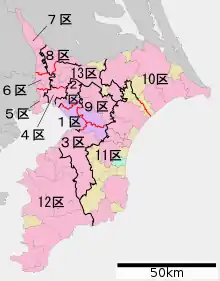Chiba 11th district
Chiba 11th district (千葉県第11区, Chiba-ken dai-jūikku or simply 千葉11区, Chiba-jūikku) is a single-member constituency of the House of Representatives in the national Diet of Japan. It is located in the eastern portion of Chiba Prefecture, and covers the prefecture's Mobara, Tōgane, Katsuura, Isumi, Sanmu, Ōamishirasato, Sanbu District (minus the former town of Hikari, now a part of the town of Yokoshibahikari), Chōsei District, and Isumi District. The district was created in 1994 as part of an electoral reform effort in the Japanese House of Representatives, and was first implemented in the 1996 general election.
| Chiba 11th District | |
|---|---|
| Parliamentary constituency for the Japanese House of Representatives | |
 Numbered map of Chiba Prefecture single-member districts | |
| Prefecture | Chiba |
| Proportional District | Minamikantō |
| Electorate | 365,194 (2015)[1] |
| Current constituency | |
| Created | 1994 |
| Seats | One |
| Party | LDP |
| Representative | Eisuke Mori |
| Created from | Chiba's 3rd "medium-sized" district |
| Municipalities | Chiba's Mobara, Tōgane, Katsuura, Isumi, Sanmu, Ōamishirasato, Sanbu District (minus the former town of Hikari, now a part of the town of Yokoshibahikari), Chōsei District, and Isumi District |
As of 2015, this district was home to 365,194 constituents.[2]
List of representatives
| Representative | Party | Dates | Notes | |
|---|---|---|---|---|
| Eisuke Mori | LDP | 1996–present | ||
Election results
| Party | Candidate | Votes | % | ±% | |
|---|---|---|---|---|---|
| Liberal Democratic | Eisuke Mori (endorsed by Kōmeitō) | 110,965 | 63.14 | ||
| People's Life | Ken'ichi Kaneko | 38,783 | 22.07 | ||
| Communist | Fumiaki Shīna | 25,997 | 14.79 | ||
| Party | Candidate | Votes | % | ±% | |
|---|---|---|---|---|---|
| Liberal Democratic | Eisuke Mori (endorsed by Kōmeitō) | 128,785 | 65.04 | ||
| Tomorrow | Ken'ichi Kaneko (endorsed by NPD) | 48,114 | 24.30 | ||
| Communist | Fumiaki Shīna | 21,110 | 10.66 | ||
| Party | Candidate | Votes | % | ±% | |
|---|---|---|---|---|---|
| Liberal Democratic | Eisuke Mori (endorsed by Kōmeitō) | 116,937 | 49.7 | ||
| Democratic | Ken'ichi Kaneko (endorsed by PNP) (elected in PR block) | 112,707 | 47.9 | ||
| Happiness Realization | Tsukasa Kuga | 5,489 | 2.3 | ||
| Party | Candidate | Votes | % | ±% | |
|---|---|---|---|---|---|
| Liberal Democratic | Eisuke Mori (endorsed by Kōmeitō) | 145,176 | 62.65 | ||
| Democratic | Masahide Tsuchiya | 70,589 | 30.46 | ||
| Communist | Jūji Kobayashi | 15,968 | 6.89 | ||
| Party | Candidate | Votes | % | ±% | |
|---|---|---|---|---|---|
| Liberal Democratic | Eisuke Mori (endorsed by Kōmeitō, NCP) | 130,863 | 63.1 | ||
| Democratic | Hiroyuki Nagahama | 60,296 | 29.1 | ||
| Communist | Kyōko Maeda | 16,358 | 7.9 | ||
| Party | Candidate | Votes | % | ±% | |
|---|---|---|---|---|---|
| Liberal Democratic | Eisuke Mori | 135,151 | 66.4 | ||
| Democratic | Masahito Matsumoto | 45,465 | 22.3 | ||
| Communist | Yoshio Kogure | 23,064 | 11.3 | ||
| Party | Candidate | Votes | % | ±% | |
|---|---|---|---|---|---|
| Liberal Democratic | Eisuke Mori | 116,195 | 61.2 | ||
| New Frontier | Kouichi Hatsutani | 45,894 | 24.3 | ||
| Communist | Moriko Īmura | 21,954 | 11.6 | ||
| Liberal League | Naoko Hara | 4,600 | 2.4 | ||
References
- Ministry of Internal Affairs and Communications (MIC): (in Japanese)
- Ministry of Internal Affairs and Communications (MIC): (in Japanese)
- Data Sets (in Japanese). Asahi Shimbun. Retrieved 6 December 2016.
- Data Sets (in Japanese). Asahi Shimbun. Retrieved 6 December 2016.
- Data Sets (in Japanese). Yomiuri Shimbun. Retrieved 6 December 2016.
- Data Sets (in Japanese). Yomiuri Shimbun. Retrieved 6 December 2016.
- Data Sets (in Japanese). Election.co.jp. Retrieved 6 December 2016.
- Election 2000 (in Japanese). Election.co.jp. Archived from the original on 2 November 2003.CS1 maint: bot: original URL status unknown (link)
- 千葉県 (in Japanese). Kunitaka Tanaka. Archived from the original on 6 November 2016. Retrieved 19 April 2017.
This article is issued from Wikipedia. The text is licensed under Creative Commons - Attribution - Sharealike. Additional terms may apply for the media files.